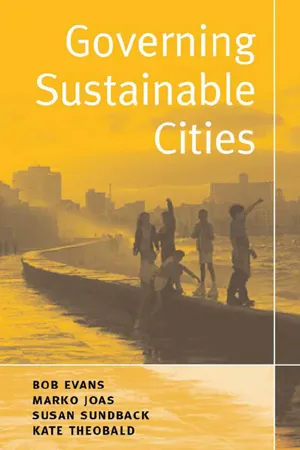
- 160 pages
- English
- ePUB (mobile friendly)
- Available on iOS & Android
Governing Sustainable Cities
About this book
Urban governance and sustainability are rapidly becoming key issues around the world. Currently three billion people - half the population of the planet - live in cities, and by 2050 a full two-thirds of the world's population will be housed in ever larger and increasingly densely populated urban areas. The economic, social and environmental challenges posed by urbanization on such a large scale and at such a rapid pace are staggering for local, regional and national governments working towards sustainability.
Solutions to the myriad problems plaguing the quest for sustainability at the city-level are equally as diverse and complex, but are rooted in the assumptions of the 'sustainability agenda', developed at the Rio Earth Summit and embodied in Local Agenda/Action 21. These assumptions state that good governance is a necessary precondition for the achievement of sustainable development, particularly at the local level, and that the mobilization of local communities is an essential part of this process. Yet until now, these assumptions, which have guided the policies and programmes of over 6000 local authorities around the world, have never been seriously tested.
Drawing on three years of field research in 40 European towns and cities, Governing for Sustainable Cities is the first book to examine empirically the processes of urban governance in sustainable development. Looking at a host of core issues including institutional and social capacity, institutional design, social equity, politics, partnerships and cooperation and creative policy-making, the authors draw compelling conclusions and offer strong guidance. This book is essential reading for policy-makers, politicians, activists and NGOs, planners, researchers and academics, whether in Europe, North America, Australasia or transitional and developing countries, concerned with advancing sustainability in our rapidly urbanizing world.
Tools to learn more effectively

Saving Books

Keyword Search

Annotating Text

Listen to it instead
Information
Table of contents
- Cover
- Title
- Copyright
- Contents
- List of Figures, Tables and Boxes
- Preface
- Acknowledgements
- List of Acronyms and Abbreviations
- 1. ‘The Level of Governance Closest to the People…’
- 2. Government, Governance and Local Sustainability
- 3. Meeting the Sustainability Challenge
- 4. Institutional Capacity and Social Capacity
- 5. Local Government and Civil Society
- 6. Governing for Sustainability
- 7. An Agenda for Action
- Appendix A:. DISCUS Fieldwork Methodology
- References
- Index
Frequently asked questions
- Essential is ideal for learners and professionals who enjoy exploring a wide range of subjects. Access the Essential Library with 800,000+ trusted titles and best-sellers across business, personal growth, and the humanities. Includes unlimited reading time and Standard Read Aloud voice.
- Complete: Perfect for advanced learners and researchers needing full, unrestricted access. Unlock 1.4M+ books across hundreds of subjects, including academic and specialized titles. The Complete Plan also includes advanced features like Premium Read Aloud and Research Assistant.
Please note we cannot support devices running on iOS 13 and Android 7 or earlier. Learn more about using the app